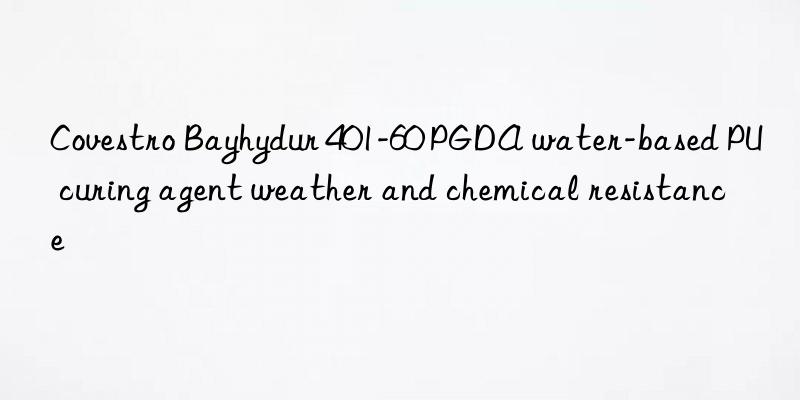
Product Features
A hydrophilic modified aliphatic polyisocyanate based on isophorone diisocyanate (IPDI), Bayhydur® 401-60 PGDA can be used as a co-reactant in water-based resins and in the preparation of resistant Curing agents for chemical and weather-resistant coatings
Form of Supply
About 60% propylene glycol diethyl ester solution
Feature data*
|
Features |
Value |
Measurement units |
Method |
|
NCOContent |
about8.5 |
% |
M105-ISO 11909 |
|
Viscosityat23°C |
about1100 |
mPa·s |
M014-ISO 3219/A.3 |
|
Color value(Hazen) |
≤60 |
|
M017-EN 1557 |
|
IPDIMonomer content |
<0.30 |
% |
M106-ISO 10283 |
*This data is for reference only. The product specifications that should be followed are subject to the final released information.
Other data**
|
Features |
Value |
Measurement units |
Method |
|
Equivalent |
about494 |
|
|
|
Flashpoint |
about84 |
°C |
DIN EN ISO 2719 |
|
Densityat20°C |
About1.11 |
g/cm3 |
DIN 51757 |
**This data is general information.
Solubility/Dilution
Generally speaking, Bayhydur® 401-60 PGDA can be diluted with a variety of polar to non-polar aliphatic solvents and is commonly used in formulated paints. Can be diluted with polar solvents to 20% solid content. The storage stability of the diluent must be thoroughly tested, especially when using gasoline-based diluents and this needs to be done with care and skill. It is recommended to add Bayhydur® 401-60 PGDA to gasoline-soluble adhesives. Only use polyurethane grade solvents (less than 0.05% water content). The solvent cannot contain reactive groups such as hydroxyl or amino groups.
Compatibility
Generally speaking, Bayhydur® 401-60 PGDA can be mixed with various Desmodur® and Bayhydur® types, such as Desmodur® N3300 or N3600, Bayhydur® 3100, XP 2655 or XP 2547.
However, compatibility must be tested in every case. At the same time, Bayhydur® 401-60 PGDA can be dispersed in various water-based adhesives such as bayhydrol® types, such as Bayhydrol® A2470, A2646, A242, A2845 and U2755.
The overall formulation (solids content, co-solvent content, type of co-solvent) needs to be considered to achieve a stable and appropriate working formulation.
If you require technical support, please ask your supplier.
Features/Applications
Bayhydur® 401-60 PGDA is easily emulsified in the water phase to form water-based paint or adhesive, and is mainly used as a co-crosslinking agent for Bayhydrol® arranged water-based resins.
By adding Bayhydur® 401-60 PGDA to the HDI-based Bayhydur crosslinker, the coating properties of two-component polyurethane coatings such as Bayhydur®
A typical mixture of Bayhydur® 401-60 PGDA and the HDI-based Bayhydur crosslinkers described above contains 5-30% Bayhydur® 401-60 PGDA in the total solids of the crosslinker.
The advantages of Bayhydur® 401-60 PGDA are as follows:
Final performance, such as
• Increased surface hardness;
• Increased chemical resistance and solvent resistance.
Application performance, such as
• Significantly longer pot life, even at high processing temperatures;
• Dry faster;
• Improved robustness, including increased bubble-free layer thickness.
About1.11
g/cm3
DIN 51757
**This data is general information.
Solubility/Dilution
Generally speaking, Bayhydur® 401-60 PGDA can be diluted with a variety of polar to non-polar aliphatic solvents and is commonly used in formulated paints. Can be diluted with polar solvents to 20% solid content. The storage stability of the diluent must be thoroughly tested, especially when using gasoline-based diluents and this needs to be done with care and skill. It is recommended to add Bayhydur® 401-60 PGDA to gasoline-soluble adhesives. Only use polyurethane grade solvents (less than 0.05% water content). The solvent cannot contain reactive groups such as hydroxyl or amino groups.
Compatibility
Generally speaking, Bayhydur® 401-60 PGDA can be mixed with various Desmodur® and Bayhydur® types, such as Desmodur® N3300 or N3600, Bayhydur® 3100, XP 2655 or XP 2547.
However, compatibility must be tested in every case. At the same time, Bayhydur® 401-60 PGDA can be dispersed in various water-based adhesives such as bayhydrol® types, such as Bayhydrol® A2470, A2646, A242, A2845 and U2755.
The overall formulation (solids content, co-solvent content, type of co-solvent) needs to be considered to achieve a stable and appropriate working formulation.
If you require technical support, please ask your supplier.
Features/Applications
Bayhydur® 401-60 PGDA is easily emulsified in the water phase to form water-based paint or adhesive, and is mainly used as a co-crosslinking agent for Bayhydrol® arranged water-based resins.
By adding Bayhydur® 401-60 PGDA to the HDI-based Bayhydur crosslinker, the coating properties of two-component polyurethane coatings such as Bayhydur®
A typical mixture of Bayhydur® 401-60 PGDA and the HDI-based Bayhydur crosslinkers described above contains 5-30% Bayhydur® 401-60 PGDA in the total solids of the crosslinker.
The advantages of Bayhydur® 401-60 PGDA are as follows:
Final performance, such as
• Increased surface hardness;
• Increased chemical resistance and solvent resistance.
Application performance, such as
• Significantly longer pot life, even at high processing temperatures;
• Dry faster;
• Improved robustness, including increased bubble-free layer thickness.

 微信扫一扫打赏
微信扫一扫打赏

